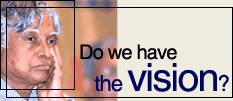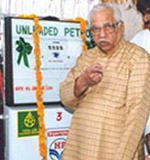|
December 10, 2002

After the death of Janata Dal United politician S Nagappa, the Karnataka government has now doubled the reward on forest brigand Veerappan's head to Rs 2 crore. But how does one catch a bandit who has eluded security forces from two states for almost two decades?
September 27, 2002

Russian President Vladimir Putin arrives at a time when New Delhi is lobbying for stronger political and military ties with Washington. Who is a better ally for India, George Bush or Putin?
Your views:
. 'Bush is words, Putin is action'
. 'Embrace capitalism and prosper'
September 27, 2002

The attack on the Akshardham temple is the latest in a series of atrocities committed against India. Are we a soft target? Tell us your views.
Your views:
. 'Learn to love your nation first'
. 'We are getting what we deserve'
. 'No. We're winners...and will be again'
. 'Israel can't stop Hamas, nor could Britain stop IRA'
. '...the NRIs are up to their usual rantings...'
. India is 'missing a dictator'
. 'We are a bunch of losers and a nation of cowards'
September 18, 2002

Once again, elections are being held in the troubled state of Jammu and Kashmir.
Despite the militant threat to disrupt polls and kill voters, despite the boycott by the All Party Hurriyat Conference and other separatist groups, and despite the killings of at least two candidates, there was over 44 per cent turnout for the first phase of the elections.
Pakistan, which has described the elections as a sham, insists that only a referendum will resolve the issue.
New Delhi, on the other hand, feels a positive turnout would show the world that Kashmir is indeed a part of India.
But will these elections actually solve the Kashmir tangle and bring about lasting peace to the region?
Your views:
. 'Learn from the Chinese'
September 11, 2002

As the world remembers the terrorist strikes on the US, what lessons has India learnt? Did the subsequent American war on terror bring the world's largest democracies closer politically and strategically?
There has certainly been an unprecedented surge in bilateral relations. The various joint working groups (including one to counter terrorism) set up since then indicate a depth of interaction that was sorely lacking earlier. The Indian American community has emerged as a voice to be reckoned with. And besides various political bigwigs, people like Intel CEO Craig Barrett, who announced massive investment plans for India, have come calling.
But America's involvement with Pakistan continues to cloud its relations with India. Despite pressure from Washington, Pakistan continues to express its inability to contain cross-border terror, which has claimed more lives than the World Trade Centre bombings. And America's growing involvement in Kashmir has put the valley on the international agenda, despite India's repeated assertion that it is a bilateral issue.
What should New Delhi do next?
Your views:
. How Dare You?'
. 'So What is India's Philosophy?'
. 'Deal With the Facts'
. 'America Zindabad!'
. 'I don't find 9/11 unjust'
September 6, 2002

The proposed sale of two public sector oil refiners - Hindustan Petroleum Corporation and Bharat Petroleum Corporation - has sparked off intense debate.
Divestment Minister Arun Shourie is keen to divest the government's stake in many PSUs through strategic sales. But his plans have hit a roadblock due to opposition from Defence Minister George Fernandes, Swadeshi outfits, opposition parties, and other `administrative machineries.'
Meetings on divestment have been postponed several times. The latest one is slated for Saturday, September 7.
The sell-off of BPCL and HPCL is seen as a litmus test of the government's privatization drive, and can impact domestic and international investor confidence.
Though he denies a rift, Shourie says resistance to privatisation may retard the reform process.
So, should PSUs be privatised? Is Shourie selling the family silver? Is privatisation hostage to politics? Should other oil PSUs be allowed to bid for BPCL and HPCL?
Your views:
. 'Govt Should Not Do Business'
. 'PSUs Have Been Ideal Employers'
September 2, 2002

On August 31, the government announced a Rs 14,561-crore (Rs 145.61 billion) restructuring package for the Unit Trust of India, India's oldest and largest mutual fund.
This massive bailout comes following the huge redemption pressure faced by the UTI following erroneous investment decisions.
Investors were shocked by the July 2001 freeze when the UTI suspended the sale and repurchase of its popular Unit Scheme of 1964 (US-64), soon after which the then UTI chairman P S Subramanyam was taken into custody by the Central Bureau of Investigation.
The blame game had begun. The stock markets began to crash and the investors panicked. Under tremendous pressure, the government decided to bail out the UTI.
But this is not the first time the UTI has been bailed out. The last bailout, in 1998, when the government forked out over Rs 3,000 crore (Rs 30 billion), was an abject failure.
The new bailout will certainly curtail fears of huge stock selling by UTI and perk up the capital markets. And the tax incentives may encourage US-64 unit-holders to remain invested in the scheme.
Will this bailout be any better that the previous ones? Should the government continue bailing out institutions like the UTI by using taxpayers' money?
Your views:
. 'It's a Criminal Waste of Taxpayers' Money'
August 27, 2002

Veerappan, a sandalwood smuggler and forest brigand who has remained at large for almost 15 years in the Sathyamangalam forests on the Karnataka-Tamil Nadu border, has struck again.
He has kidnapped Janata Dal politician and former minister H Nagappa. His demands, among other things, include the release of Tamil Nationalist Movement leader P Nedumaran, 'Kolathur' Mani and Nakkeeran reporter Sivasubramanian, who are now in Tamil Nadu jails.
Karnataka fears that Tamil Nadu's unwillingness to free these people may spark anti-Tamil tensions in Karnataka.
Two years ago, the Supreme Court had ruled against the release of some TADA detainees in exchange for Kannada matinee idol Rajakumar, who had been kidnapped by Veerapan. It is believed that a large sum of money was paid to finally secure Rajakumar's release.
Given the situation and the limitations, what are the options before the Karnataka government?
Your views:
. 'Get the Politicians Behind him First!'
. 'We have to end this bargain culture'
. 'Sacrifice Nagappa For Sake of Future Generations'
. 'Let Veerappan Roam Free'
. 'Pay Veerappan to Kidnap Musharraf'
August 16, 2002

The controversial new ICC contract prohibits players from fulfilling their personal contracts with advertisers if they clash with the official sponsors of tournaments conducted by the International Cricket Council.
"If a player now finds that through his own actions he has put his commercial interests ahead of his ability to play for his country, he needs to decide what is more important to him, the money or playing for his country," the unbending ICC chief executive, Malcolm Speed, said.
But the players argue that the ICC did not take them into confidence on the provisions of the contract that the game's governing body signed with member boards two years ago.
Top Indian players have, therefore, refused to sign the contract. The BCCI says it's through talking with them, and will definitely send a second-string team for the ICC Champions Trophy.
Are the Indian players being unpatriotic by not signing the contracts? Or is the ICC trying to deprive them of their legitimate rights in its bid to fill its own coffers?
Your views:
'BCCI doesnt have the capacity to take a stand'
'The BCCI has to support Indian players'

'...Similar to the first vision, which created a movement to achieve freedom with unity of minds of our people and unity of purpose in actions, we need a second vision, which will integrate people from all walks of our society towards a common purpose. The second vision of our nation is to transform it from the present developing status to a developed nation...'
President A P J Abdul Kalam in his address to the nation on the occasion of the nation's 56th Independence Day.
Amidst the usual scams, shams, and moments of glory, India turned 55 this year.
But sadly, the nationalistic fervour of the freedom fighters has been slowly but surely replaced with the 'I, me, myself' mentality, which pervades both our political and social structures today. The politicians and the general populace are far too busy thinking about themselves to worry about nation-building.
So will President Kalam's dream of a 'second vision' remain just that?
Your views:
. 'Let Us Remain Optimistic'
. 'Each one of us must share that dream'
 Is Ram Naik
Is Ram Naik
Guilty?
An agitated opposition is demanding the resignation of Petroleum Minister Ram Naik and an inquiry by the Central Bureau of Investigation into the reported allotment of petrol pumps to ruling party functionaries in different parts of the country.
The government, in turn, has cancelled all allotments made after January 2000, and released the names of various opposition leaders including Congress politician Manmohan Singh and vice-presidential candidate Sushil Kumar Shinde, who reportedly made recommendations to Ram Naik for such allotments.
But describing this as a "methodology of mudslinging" and a "dirty and diversionary ploy," the opposition continues to demand that Ram Naik assume responsibility and step down.
Should he?
Your views:
. 'Did Modi Resign? Did Fernandes?'
. 'Two Wrongs Don't Make a Right'
. 'Why Single out Ram Naik? What about the others?'
. 'Resignation will not clear the rot'
29 July, 2002
 L inks between the underworld and Bollywood are no secret. Attempts to intimidate directors and actors unwilling to toe the line and pay the price are legion. And these are just cases that are reported. The Bharat Shah case, where the film financier and diamond merchant was accused of using underworld funds to produce a movie, brought the case into the limelight early last year.
L inks between the underworld and Bollywood are no secret. Attempts to intimidate directors and actors unwilling to toe the line and pay the price are legion. And these are just cases that are reported. The Bharat Shah case, where the film financier and diamond merchant was accused of using underworld funds to produce a movie, brought the case into the limelight early last year.
Shah Rukh Khan, Sanjay Dutt, Preity Zinta, Rani Mukherji, Salman Khan, Rakesh Roshan, Mahesh Manjrekar and Mansoor Siddiqui figure in a list of 50 witnesses cited by the prosecution in the case. And now, the recent admission of recorded conversations purportedly between Sanjay Dutt and other film personalities and Dubai-based ganglord Chhota Shakeel exposes the extent of the rot.
Can the mafia be delinked from Bollywood? How?
Your views:
. 'What was the police doing for so long?'
. 'Shun, Ban, Boycott Bollywood!'
. 'Mera Bollywood Mahaan?'
18 July, 2002
 Ending months of speculation, Gujarat Chief Minister Narendra Modi has dissolved the state assembly and sought elections eight months ahead of schedule.
Ending months of speculation, Gujarat Chief Minister Narendra Modi has dissolved the state assembly and sought elections eight months ahead of schedule.
The decision is not without its opponents, for the state is yet to recover fully from the communal bloodbath that followed the Godhra train outrage. Holding elections in a communalised atmosphere, say Modi's critics, could further polarise an already divided society.
Technically, of course, the chief minister has exercised his democratic option. But the last word on the election date will be the Election Commission's. Given that voter lists are to be updated, and that large sections of the population have been uprooted in the violence, the state may not be fully prepared to hold polls, it is felt.
Do you think elections should take precedence in Gujarat over riot relief and rehabilitation? Or will it be an exercise in futility?
Your views:
. 'Are we a banana republic?'
. 'Damned if you do and damned if you don't'
. 'Stop Gujarat from becoming another Kashmir'
. 'Let's go for the Agni Pariksha'
. 'If it can be held in J&K and Bihar.why not Gujarat'
. 'By sacrificing eight months he wants to gain 5 years'
18 July, 2002

Avul Pakir Jainulabdeen Abdul Kalam has just been elected the 11th President of India.
There are those who believe the Presidency is ceremonial, but they won't be entirely correct. True, there is a lot of symbolism attached to the office, but the Presidency goes beyond that.
The founding fathers envisaged the President not as a symbol as much as the conscience keeper of the political establishment. Not an alternative power centre but as unobtrusive counsellor. Not a kingmaker, but an elder statesman who will enrich the government, and the nation, with his sagacity. From Rajendra Prasad down to Kocheril Raman Narayanan, each occupant of Rashtrapati Bhawan has lent his personal imprimatur to the office.
What kind of President would you want Abdul Kalam to be?
Here's your opportunity to both congratulate him and tell him what you would like him to do. For India. For the future.
What Readers Say
. 'It is India's great fortune'
. 'I expect missiles from the President'
. 'Rewrite the Constitution'
. 'I hope you will not be just another rubber stamp'
. 'The entire nation is behind you'
. 'Chase your dream of India becoming a developed nation'
. 'I expect an anti-corruption bomb'
. 'India will now know the meaning of countdown'
15 July, 2002

Since the terrorist attack on Parliament in December last, the Indian Army has been moblised on the border with Pakistan as part of New Delhi's 'coercive diplomacy'.
But the seven months since have not been incident-free. Apart from the normal shelling across the borders, we have had Kaluchak, where for the first time terrorists gunned down members of soldiers' families, the killing of Hurriyat leader Abdul Ghani Lone and, of course, the latest outrage near Jammu where 27 civilians were gunned down.
So has the government's coercive diplomacy failed, despite international assurances that Pakistan will rein in its dogs of war? In the face of Islamabad's recalcitrance, has New Delhi painted itself into a corner by deploying forces that it had no intention of using?
Is war with Pakistan now the only way out?
Your views:
. 'Development, not war'
. 'It's a question of When, not If'
10 July, 2002

An all-party meeting on Monday rejected the Election Commission move to implement the Supreme Court directive asking candidates to disclose their antecedents, instead asking the government to bring out a comprehensive legislation to 'curb criminalisation of politics' and 'bring in probity in public life'.
Are the politicians correct, or is this just an attempt to ensure that `tainted' candidates are not debarred?
Your views:
'I urge the Americans to come forward and rule us' - July 14, 2002
'The court cannot direct the government' - July 14, 2002
'Pack'em, wrap'em and send 'em to Guantanomo Bay' - July 12, 2002
'Could someone drop a bomb on Indian parliament?' - July 11, 2002
A Dreadful Disease Called "Selective Consensus" - July 11, 2002
Are these views actually heard by anyone? - July 11, 2002
'An Entrance Exam for Politicians?' - July 10, 2002
Disclaimer
|